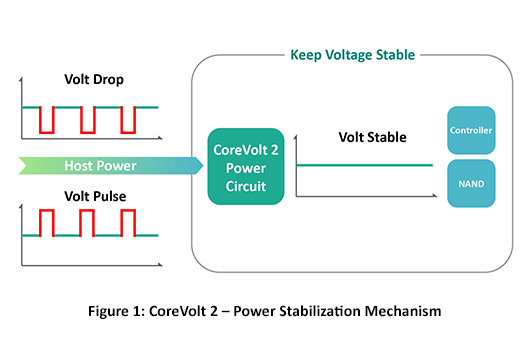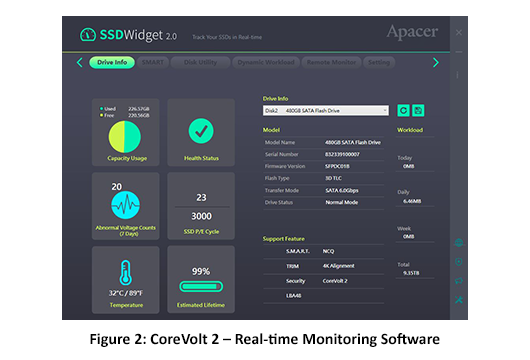|
REAL-TIME SSD POWER STABILIZATION FOR DATA AND DEVICE PROTECTION |
CoreVolt 2 technology provides real-time voltage detection and protection against voltage instability. When voltage fluctuations are detected, the SSD automatically engages backup power supplied by tantalum polymer capacitors to stabilize the voltage, ensuring uninterrupted operation.
In today’s computing environments, system reliability is essential for maintaining data integrity and ensuring smooth operations. One of the most critical threats to this reliability is voltage instability—often caused by inconsistent power sources, sudden surges, or challenging environmental conditions. These fluctuations can lead to data corruption, hardware damage, and unexpected system downtime, resulting in costly disruptions and reduced operational efficiency. |

|
|
How It Works |
CoreVolt 2 operates through an integrated, real-time voltage detection system that continuously monitors the input voltage supplied to the SSD. This technology is designed to identify any form of voltage instability, whether from power drops or other fluctuations. As soon as the system detects a deviation in the voltage beyond acceptable thresholds, it immediately triggers the activation of a backup power system. This detection occurs rapidly, ensuring that there is no delay in responding to power disruptions, which is crucial for protecting data and maintaining operational continuity. Once voltage instability is detected, the CoreVolt 2 power circuit activates backup power supplied by tantalum polymer capacitors. These capacitors temporarily take over, providing the necessary power to stabilize the SSD’s operation during the fluctuation. The capacitors act as a buffer, compensating for any voltage variations and ensuring that the SSD continues to operate smoothly without any interruptions.

|

|
|
|
CoreVolt 2 is ideal for industries requiring high reliability and uninterrupted operation, particularly in environments with voltage instability. It serves sectors like industrial computing, rugged systems, aerospace, transportation, mining, and robotics, where equipment faces harsh conditions, power fluctuations, and potential surges.

